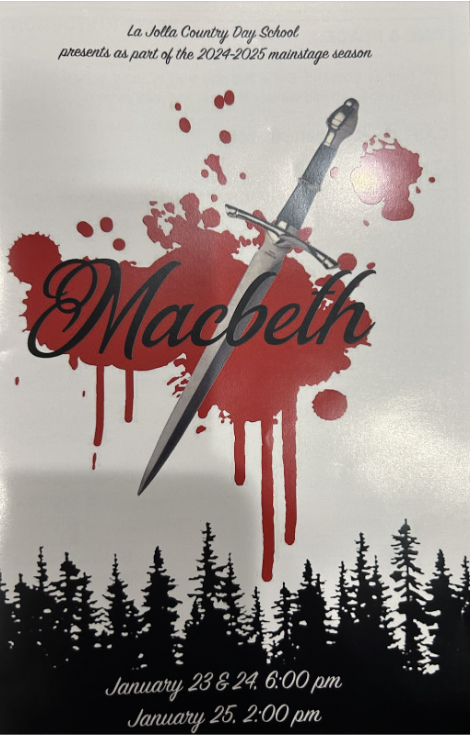Over the weekend of January 31st to February 1st, select members of the LJCDS orchestra and band traveled up to the Viewpoint School in Calabasas for an intensive weekend of playing through a program called the California Association of Independent Schools (CAIS). I was lucky enough to be included in this trip. Over these two days, we rehearsed with a guest conductor for many hours, and then performed what we had rehearsed on the second day. My friend Sedona Lineback and I had the great opportunity to interview the guest conductor, Pola Benke. We asked her about her conducting style, obstacles in the way of her goals, and her favorite part about being a conductor.
Ms. Benke was born in Poland and started playing the cello when she was eight. She studied cello as a performer, and got her masters in cello at the Boston Conservatory (she also has a bachelors in cello from Oklahoma City University and has a diploma in cello performance from Azusa Pacific University). She says her “dream was to play in an orchestra,” so after obtaining her masters, she traveled back to Poland to play professionally.
Ms. Benke did not originally intend to become a conductor. During her time in a professional orchestra, she met many guest conductors, some who “loved playing together and music” and some who erred on the side of “questionable” as they “almost made us hate each other.” This exposure led her to thinking about what it would be like to be a conductor. “I wanted to give it a try and figure out what it is about. So I never thought I would actually become a conductor. It was just about expanding my horizons as a musician, but I fell in love with it.” This love of conducting led her to conducting orchestras such as the Long Beach Symphony, Riverside Philharmonic, and she will soon be conducting the Santa Monica Symphony. This is no small feat, as even conducting one orchestra is arduous.
Every conductor has their own style of conducting. Some conduct every beat, some let the orchestra take over, some are very feeling and dramatic in their movements, while others are more stiff. Think of a conductor as the editor of a novel or magazine. They help fine tune the writing and make sure that everything is organized and eloquent. Ms. Benke’s conducting style was something that Sedona and I had not encountered before. The conductors that we’ve worked with usually conduct every beat, and control the sound, rather than letting the orchestra take over. Ms. Benke stood while she conducted and used large sweeping movements with her body to give us cues on when to play louder or softer. At times, she would lean back and put her hands down and let the orchestra control the sound. “Once you feel comfortable conducting, you realize that you want to show the music and kind of direct and lead what direction the orchestra is going in. So I don’t have to give you every single beat. I trust you, and I want you to trust yourself because I’m just giving you direction… Instead of me sticking to the vision that I had for the music, you gave me some other ideas, and I love bringing that to the table. Just your instinct, you know, and that’s the beauty about conducting.” She compared her conducting style to ducklings following a mother duck. She does not completely control the sound, but instead guides it. “I want you to grow as a musician. I want you to play music, not notes.” Ms. Benke’s goal as a conductor is to “bring people together and make them love each other so they can create the best music they can…and not be afraid to show their emotions instead of hating each other and competing on something like that.” She says that her favorite part about being a conductor is “Bringing people together. Just showing you what you have inside you and just letting it be.”
Even though Ms. Benke has worked very hard to get where she is now, she told us that her journey did not come without its challenges. A major obstacle that was, and is, in her way was “being a woman.” She admitted that sometimes, she’ll walk into a room to conduct, and some people will immediately begin to judge her, as “people just don’t give the credit to women as much.” She says that “Sometimes we just need to prove ourselves even more, which makes us work harder.” Ms. Benke brought up the point that it is different for female musicians in Europe than in the United States. “Women in Europe were always more empowered, and they were holding higher positions. There’s lots of women conductors in Europe, but not as many here [in the U.S]. And if they are, they’re not even in higher positions.” But she still is grateful for all the mentors she has had that were men who helped her push through this barrier. “I still have had many mentors who helped me greatly who were men. I’ve been very lucky; knowing those men just helps me forget about those who didn’t support me just because they thought I didn’t have enough authority or that I’m not strict enough or that I’m too kind.”
She offered some valuable advice to young students like my friend and I; if a long journey in a challenging profession teaches you anything, it is to be yourself and aim big. No aspiration is too large, and the best way to reach that goal is to stay true to who you are. One of Ms. Benke’s dreams is to conduct a ballet, or the Boston Symphony Orchestra. She laughed when she admitted that this is a massive undertaking, but she is not afraid of it. “I’m aiming really high. Therefore, I will work, and I believe, like, if you set big goals, then other things along the way will happen that are large too.” She advised us to never “limit yourself. Don’t say, oh, I’m just not worthy of that, or I would just aim here, and that should be fine. No. Never. Sky is the limit. Aim high and beautiful things will happen on the way.” Remaining who you are in the face of adversity and surrounding yourself with honest people are also important. “If you’re real, then people are willing to open up too. In anything you do in life, I think authenticity is very important. So really trust your gut when you’re, like, surround yourself with people. The real people will be comfortable to be around.” All of this advice can be applied to high schoolers as well. High school is hard for everybody, and Ms. Benke admitted that high school was challenging for her as well. “High school was the hardest because you’re figuring out who you are. Honestly, that was the worst time of my life…because everyone was trying to discover who they’re not and figuring that out.”
Having the opportunity to work with Ms. Benke and to interview her was very inspiring for me and Sedona. Even now, I still think about her advice, like her advice on being yourself and aiming big. She is someone who has been in music for a long time, just like Mrs. Diener, LJCDS’s Upper School orchestra teacher. I asked Mrs. Diener what she thought about Ms. Benke. She was just as impressed as we were. She found her to be professional and accomplished, and felt that “she really brought the best out of everybody.” Ms. Benke’s advice on high school is pertinent to students who attend Country Day. High school is a challenging time, but if you remain yourself and follow your passions, you’ll bring out the best in yourself and everybody around you.




